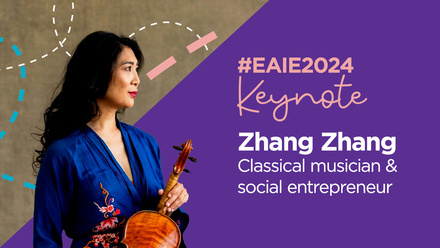Top 5 EAIE blog posts from 2023

As another year comes to an end, we’re looking back on all we’ve experienced and learned together this year in the EAIE community. Between our in-person meetings – like the EAIE Academy in Amsterdam and of course the 33rd Annual Conference and Exhibition in Rotterdam – the blog is an important vehicle for our community to keep in touch and share our expertise and insights with one another. Before we head out for the holidays, revisit the five most popular EAIE blog posts from 2023.
How AI is shaking up higher education
Artificial intelligence is here to stay, and it’s making its impact felt in the higher education sector. According to How AI is shaking up higher education, that doesn’t mean there’s an app to persuade a reluctant student to enrol (yet), but what it does mean is a world of opportunity for higher education institutions to become more efficient, more effective and to offer deeper learning experiences.
Gender inequality in higher education: lessons from Ireland
The gender gap in higher education is a complex structural challenge. Ireland’s recent review of gender equality indicates some promising paths forward, as explored in Gender inequality in higher education: lessons from Ireland. In Europe in 2021, more women than men had a third-level qualification – but women hold just one quarter full professor posts, and just under one quarter of institutional leadership roles. This gender gap in educational attainment and career outcomes is persistent and growing. This blog post dives deep into the data on inequality at various career levels within the field of higher education.
International research mobility: beneficial for an academic career?
Academic careers are extremely competitive. Many researchers are confident that international research experience will enhance their chances of career promotion. But things are not always what they seem, which is important for both individual researchers and institutional policymakers to understand and respond to. A period doing research abroad is often touted as a solid career-booster for academics, but International research mobility: beneficial for an academic career? that that’s not always the case.
International student tuition fees: reflections from Sweden
Free health care, generous parental leave, paid vacation and a high quality of living are trademarks of the Scandinavian countries, where, until recently, free university education for international students was also a part of the social contract. What have been the ripple effects of the introduction of international student tuition fees in Sweden in 2011, and what lessons can be learned from this policy and its impact? International student tuition fees: reflections from Sweden in October.
5 steps to an aligned internationalised curriculum
Educational design is often based on the principle of constructive alignment. When designing internationalised curricula, the alignment across student learning outcomes, their assessment and the teaching and learning activities is even more critical and challenging. In their August blog, 5 steps to an aligned internationalised curriculum why constructive alignment matters in curriculum internationalisation, and outline five important steps to consider in the process.





